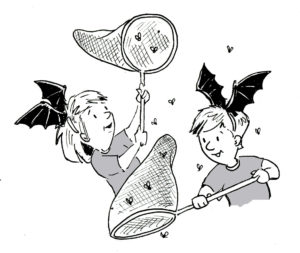Little Bats: A Big Deal

To view the photo-rich magazine version, click here.
Originally appears in the Summer 2018 issue.
WHAT COMES TO mind when you or your students think of bats? Old movies and cartoons about vampires? Winged creatures swooping down from the sky, just to get tangled in your hair? Or do you think about one of Mother Nature’s most efficient bug zappers, helping to eliminate mosquitoes and other “pest” insects? No matter what your initial thoughts are, bats are vitally important to our ecosystems in North America and around the globe. Here you will find general information about these winged creatures, threats to them globally, and what we can do in our own classrooms (or backyards) to prevent their populations from declining further.
Three Widespread Species
The little brown bat, or Myotis lucifugus, is one of the most geographically prevalent species of bat in North America: they are found from Alaska to Mexico, and are equally spread between the East and West Coasts. They roost (sleep) in a variety of places, such as trees, buildings, and under wood piles during their active months: mid-May through early September for northern populations and mid-March through early November for southern populations.2 However, they typically keep their day roosts and night roosts separate to deflect predators (like owls, hawks, snakes, and domestic cats) off their trails. During the winter months, they roost in caves or abandoned mines (referred to as hibernacula) in order to separate themselves from their other roosting sites.2 Little brown bats are insectivorous, and prefer insects with an aquatic life stage such as mosquitoes and mayflies. The bats will also consume midges, flies, gnats, wasps, and moths. Most bat species can eat up to half of their body weight in insects per night, and nursing females will actually consume their body weight — or more! — each night. These dietary preferences lead to their preferred roosting sites being wooded areas near water sources.
This content is restricted to subscribers only.
If you are not yet a subscriber, please consider taking out a subscription here.
If you are an existing subscriber, kindly log in or contact us at info@greenteacher.com for more information.





